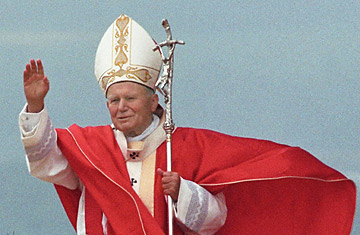
Pope John Paul II waves to a crowd in Gniezno, Poland, during a visit to his native country in 1997
(7 of 8)
The 20th century has been one of enormous tribal slaughter, much of it distant from the world's eyes. As many as 200,000 Tutsi and Hutu tribesmen massacred one another during tribal warfare in Burundi in the early 1970s, for example. Some 3,000 Bengalis were murdered in Assam, India, last February. More than 100,000 Iranians and Iraqis have been killed in their war, which is now three years old. And each slaughter enforces upon the survivors in the tribe the imperative to take revenge.
Yet in a sense, the greater the sin, the more the forgiving is necessary—even indispensable. Consider the American South, the scene of an enormous historical wrong that persisted for centuries.
In 1982, when he was running for re-election for Governor of Alabama, George Wallace knew that he would need the black vote in order to win. He appeared before the Southern Christian Leadership Conference and apologized for his behavior toward blacks in the past. He had once vowed that he would never be "out-niggered" again by a white opponent, and he had stood in the door of the University of Alabama to prevent two black students from enrolling. But after his apology, the black voters of Alabama forgave him, and voted for him in large numbers.
All over the South, in a remarkable display of grace, blacks forgave the injuries of the past. Says the Rev. Donald W. Shriver, a native Virginian who is president of Union Theological Seminary in New York City: "I think the decision by descendants of black slaves in this country to become citizens and active members of this society is a remarkable case of forgiveness. By and large, blacks have had a steadier sense of belonging to the United States and of being true citizens than many of those who have oppressed them." Says Atlanta Mayor Andrew Young: "We shared the burden of guilt for past racial abuses and we moved toward reconciliation. And we've grown together as brothers and sisters and we've prospered, mainly because of the ability to forgive and be reconciled."
Christ preached forgiveness, the loving of one's enemies.
It is at the center of the New Testament. Stated nakedly, superficially, the proposition sounds perverse and even self-destructive, an invitation to disaster. Those skeptical about the larger uses of forgiveness, in fact, tend to think of that principle as a little weak-minded. Rabbi Neil Gillman, assistant professor of philosophy at the Jewish Theological Seminary of America, does not believe that a private impulse toward forgiveness, symbolized by the Pope's visit to Agca, can be translated into a public policy of reconciliation. Jewish tradition, he says, links forgiveness to behavioral change. "There is a healthy amount of realism in the doctrine," says Gillman. "Forgiveness should be tied to the ability to see a real change in human—or national—action. An inner attitude of contrition on the part of the wrongdoer is not sufficient. Israel's stance [its refusal to reconcile with the P.L.O.] is based on the fact that the P.L.O., for all its verbalizing, still takes responsibility for destroying a bus.
There is no evidence of real contrition."
